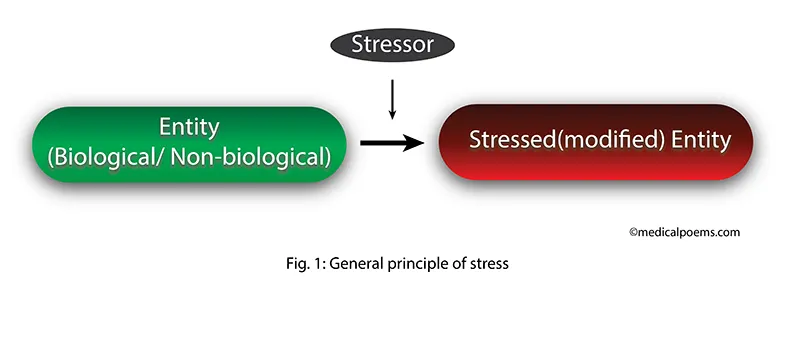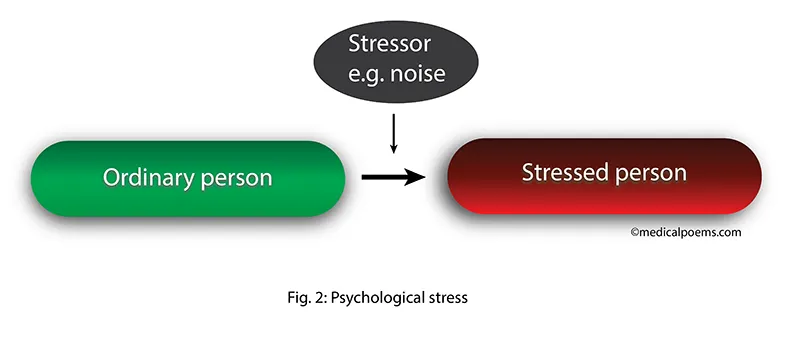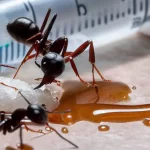Stress is part and parcel of life; in fact, the very process of coming to life (birth/delivery) is “stressful”.
This article showcases stress, including its causes, the body’s response, as well as survival secrets (reliable stress management strategies).
As is tradition, first we present a poem about stress: “A World With No Stress“. Press ‘play’ below, imbibe each line and find its deep meaning.
A world with no stress
I used to long for a life of no stress,
a world without pressure to impress,
where there’s no failure or success
O! what bliss, if struggle was needless,
if there was no ‘no’, just yes
Alas, such thought I learned to suppress
for it serves to weary mind, and depress
Albeit sometimes negative and pointless,
stress comes with positivity and progress
What if all stress was rewarding?
as in the perfect body after exercising,
medals and encomiums after competing,
a baby’s cry after planned birthing,
a letter of admission after studying,
or promotion after years of waiting
If only we could make exhilarating
all obstacle, like the thrill-seeker skydiving,
or the hobbyist hobbying
Imagine a world with no disasters and crises,
like floods, earthquakes and toxic bosses,
wars, bullying, death or tragic losses
What of traffic, city smokes and noises,
crime, insecurity, poverty and illnesses,
addictions, phobias and our personal crosses?
No one should have to endure despises,
be it from self, peers, or the masses;
call it self-loathing, rejection, or racial classes
Everyone is a victim, including billionaires
Embrace your situation in spite of your fears
Be bold; fortune favors the one who dares
Exercise, even if it’s just climbing the stairs
Rest: one who overworks, errs
Make a timetable; organize your affairs
Let it out; no laurels for holding back tears
Talk to a friend; one who actually cares
No matter your stressors, everyone has theirs
'A world with no stress', explained
Background
Stress is a word, which enjoys usage in different fields, like biology, linguistics and medicine.
Our focus is on its medical usage; however, the definition of stress appears to be similar, irrespective of context.

The illustration above shows ‘a stressor‘ acting on ‘an entity‘ (biological or non-biological) to ‘modify‘ it.
This simply means that anywhere stress is used (linguistics, biology and so on), there is always a stressor acting on an entity to modify it.
- Linguistics: adding loudness(stressor) to a word(entity) in a sentence may change(modify) the meaning of that sentence entirely (learn more).
- Physics: When you pull(stressor) a spring(entity) apart, it stretches(modify) up to a point where it may return to normal or deform completely (learn more).
What does stress mean, in humans?
In humans, stress is the way the body responds to ‘stressors‘.
- This response may be a feeling of emotional tension or pressure (psychological stress).
- It may also be a physical change, which may be normal (physiological) or abnormal (pathological).
Stanza one gives an overview of stress and how essential/ inevitable it is.
Psychological Stress
Consider this statement:
“YOU STRESS ME OUT”
It is an informal way of saying:
“YOUR ACTION MAKES ME TO FEEL STRESS“
Or better still:
“YOUR ACTION PUTS ME UNDER EMOTIONAL TENSION OR PRESSURE“
According to the statement above, “YOUR ACTION” is a stressor, which causes “ME” to feel “EMOTIONAL TENSION or PRESSURE”

This means that stress (psychological) is a feeling of emotional tension or pressure.
NOTE: In everyday usage, when people use the word ‘stress’, it usually refers to psychological stress.
Physiological and Pathological Stress
The body’s response to stressors also involves production of substances which help it to adapt.
For example, you are tired and hungry after a busy day; suddenly, you hear explosions and gunshots outside. Energy will come from ‘nowhere’ and you will run to safety.
The body produces a substance known as adrenaline, which acts on the liver to make glucose, an important energy fuel, available. Normally when you eat, some of your food is stored in the liver as glycogen for quick conversion to glucose for events as this.
Adrenaline also acts on the heart, making it beat faster, for rapid distribution of blood and glucose to your legs to ‘power’ your escape.
If the stressor (explosions and gunshots) persist for more than a few days, the body still tries to make glucose available. However, the glycogen in the liver becomes inadequate and energy can only be made available by converting fatty acids from fat stores (adipose tissues) to glucose.
With time, even the fat stores will not be able to meet up with energy demands and the muscles start to get broken down as amino acids, to glucose.
As the body mobilizes glucose from fat and muscle, weight loss sets in; this is a typical scenario in starvation and war.
From the above, a physiological stress response (also known as ‘fight or flight’) becomes pathological.
Usually, the same stressor which causes ‘physiological’ stress tilts the response to ‘pathological’, if its intensity or duration of exposure is too much.
NOTE: The term ‘pathological’ or ‘pathology’ refers, or relates to disease or a disease state.
Stress also contributes to ‘pathological states’ like stroke, ulcers, hypertension and depression.
Symptoms of stress
When stress starts to build up, you may experience the following symptoms:
- Headaches (stress or tension headaches)
- Unusual tiredness
- Irritability
- Sadness without cause
- Anxiety
- Racing thoughts
- Low sex drive
- Restlessness
- Cold sweaty hands
- Mood swings
- Trouble concentrating
- Forgetfulness
- Trouble sleeping
- Sleeping too much
- Eating too much
- Loss of appetite
- Dizziness
- Unprovoked anger
What causes Stress?
The short answer is ‘stressors’; in other words, anything which causes stress is a stressor.
We could classify stressors as those associated with positive or negative events; for example, birth of a child and termination of appointment, respectively.
Stressors may also be present for a short (acute) or long (chronic) period of time. Examples include sudden death of a spouse, versus years of abuse by a toxic boss.
For a broader perspective however, let us look at four(4) classes of stressors:
NOTE: these stressors may elicit psychological, physiological or pathological responses (see above).
- Crises or catastrophes:
- usually happen infrequently, suddenly and you have no control over them.
- cause a great deal of stress.
- examples are floods, riots, the covid pandemic, earthquakes and wars.
- Major life events:
- also not frequent and cause stress, even with proper preparation.
- examples are child birth, wedding and school examinations.
- Everyday stressors:
- you encounter them frequently.
- examples include traffic jam, bullies at school and abusive bosses at work.
- Ambient stressors:
- you may not be able to pinpoint these stressors, but subconsciously, you know that they are present.
- examples include: being broke, insecurity, noise/air pollution or even the state of the economy.
What happens in the body during stress?
If you start running or engaging in sporting activities immediately after eating, you may have cramping abdominal pains.
This happens because at first, blood pools to the intestines to facilitate digestion and nutrient extraction from food; the muscles however take priority with the sudden switch to a sporting activity.
The resulting blood deprivation of the intestines in turn leads to abdominal cramps.
Similarly, whenever you encounter a stressor, the body tries to adapt by diverting resources from ‘less relevant’ activities to ‘more important’ needs.
Whether it is an emergency, or a long-standing situation, the body’s response is similar; ‘survival first‘.
Of course in an emergency, for example, sudden attack by an aggressive dog, the response is quicker. In this scenario your body prepares you for ‘fight, or flight (run)’.
If the stressful situation persists, the body develops ‘resistance‘ and appears to adapt. For example, adjusting to traffic in a busy city after weeks of relocating there from a rural community.
With time, fatigue sets in and the ability to resist or withstand stressors diminishes. This may lead to ill-health directly or indirectly.
- Ill-health may result directly from changes in normal body function (physiology). For instance, stress leads to decrease in immunological ability causing resurgence of latent viral infections, like common cold.
- The indirect effects of stressors and stress may be from the development of unhealthy habits like smoking and drinking.
Children and stressors
It is very easy to miss the features of stress in children, or assume that they do not undergo stress.
Well, children experience stress like adults do, and it may lead to physical, as well as psychological effects also.
Children have relatively underdeveloped abilities to cope with stress and may not be as expressive as adults. The effects of stressors on them may therefore be quite rife and more pronounced. They include:
- falling ill frequently.
- withdrawing from family, and friends.
- bullying other children.
- doing poorly academically.
Stressors in children could be:
- parents getting a divorce.
- changes in the body, such as puberty.
- frequent relocation and changing of schools.
- domestic abuse.
- feeling of loneliness, maybe due to parents not always being around.
Sure stress survival secrets (Stress-management)
‘Our poem’ (see above) is about someone who wishes for a world with no stress.
The truth is that there is no existing without stress.
In fact, one of the most effective ‘stress management’ techniques is exercise, which is more or less ‘regulated stress’.
Be that as it may, proven secrets that not only help you to survive, but also thrive in the face of stress, include:
- Exercise
- Rest (as important as work)
- Do something outside your routine, e.g. karaoke, swimming, and so on
- Pick a hobby, e.g. gardening, music, movies and so on.
- Volunteer for humanitarian work
- ‘Let it out’; do not bottle up emotions.
- Try to be organized
- Learn to adapt
- Change environment
- Get a pet
- Join a support group
- Seek professional help
Exercise is particularly important; the fourth line of the last stanza of our poem says:
“Exercise, even if it’s just climbing the stairs”
Exercising for fitness or body building requires considerable dedication, however, as little as 10 minutes of aerobics every other day helps to relieve stress.
Running, cycling and skipping are exercises which do not require gym equipment and you can engage in them when you notice the symptoms of stress building up.
Rest is also very important; stress builds up when you work for long periods, without rest.
The last stanza of the poem above gives some additional pointers that can help.
Conclusion
Stress is inevitable, however, you may learn to cope with it.
The body normally tries to adapt to stressful situations, but if it persists, disease may ensue e.g. stroke and depression.
Children also undergo stress.
Coping mechanisms include: Exercise, rest and change of environment.
Now go through the poem above again, and try to make sense of it




